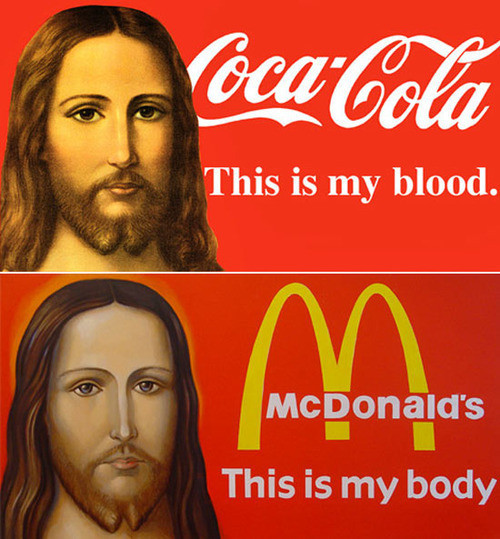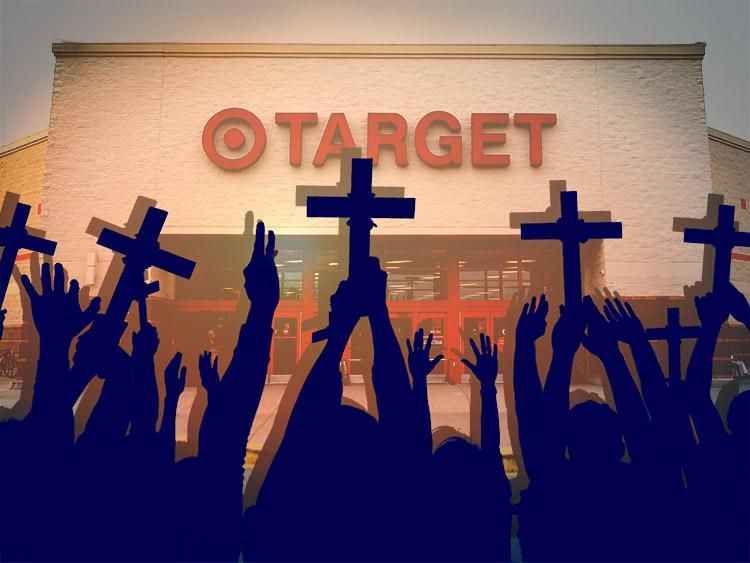Faith as product or just enough Jesus to look good on the college app, please….
 In the thoroughly engaging, if very dense, Consuming Religion: Christian Faith and Practice in a Consumer Culture Vincent Miller frames consumer culture ‘not as a deformation of belief but as a particular way of engaging religious beliefs that divorces them from practice.’ (Miller, 12)
In the thoroughly engaging, if very dense, Consuming Religion: Christian Faith and Practice in a Consumer Culture Vincent Miller frames consumer culture ‘not as a deformation of belief but as a particular way of engaging religious beliefs that divorces them from practice.’ (Miller, 12)
This provides the reader with a lens for engaging our consumer society and beginning to understand how that society shapes and influences how we experience religion and express religious belief.
It is something of a easy cliche to say that faith and/or religious expression is the perfect antidote to a society overly focused on consumerism and commodification – and, of course, it can be – but Miller highlights well that that viewpoint also often misses the pervasive effects that the consumer society has on our experience of the religion and religious expression itself.
I have had some very stark experiences of the commodification of our religious experience, especially during my time in youth ministry. The first is an image that has been stuck in my head for twenty years now. I was working at a very large (3,000member) church located in a wealthy suburb of Pittsburgh, with a pretty typical set-up: an ‘early church’ and a ‘late church’ with Sunday school in-between.
The youth and children’s Sunday school program started at 9:45 each Sunday and the various classes included around 200 kids. The image that has stuck with me all this time, however, didn’t actually occur within the Sunday school, but rather, out in the parking lot. It was there, at around 9:30 each week that cars would start lining up, eventually backing up all the way to the road, with parents dropping off their kids for Sunday school. Some of the parents would, come back for ‘late’ church after a quick breakfast, some would just come back around noon and pick the kids up….
At the time, as a 21 year old, it was pretty shocking to me – how could these parents see the value and importance of biblical education for their kids – not to mention the worship and fellowship, but not want or value it for themselves? As I think about it now, I think of it as the first, clearest example of the commodification of religion. In that community, membership in our church community had value beyond the religious and moral benefits that we think of, and those parents were in a very real sense ‘purchasing’ a service because of the perceived benefits that it held.
Fast forward a few years and I am the youth minister at a small church in Fairfield County CT. I am standing on the sidelines of a girls high school soccer game, having a conversation with a few parents of youth group kids. During the course of the conversation, the topic turns to typical teenage lack of gratitude and expecta tion. At this point one of the parents, casually says, I can always tell when ____ (name withheld to protect the guilty!) needs her ‘yearly dose’ of mission trip.
tion. At this point one of the parents, casually says, I can always tell when ____ (name withheld to protect the guilty!) needs her ‘yearly dose’ of mission trip.
And then, she went on to explain to a few of the parents whose kids hadn’t been on a mission trip, all the benefits of going on one: the things they learn, how they come back ‘changed’, etc. The mom did a fairly good, fairly accurate job describing all of the things that I might have highlighted as the spiritual and practical benefits of a short term mission trip.
The issue, of course, even more pronounced after engaging with Miller’s work here is this: when religion is experienced as a commodity does that invalidate the benefits of it? Were the child’s experiences on the mission trip any less real, meaningful or spiritual because they were ‘purchased’ as a commodity by her parent? The same question, of course goes for all of those children dropped off for Sunday school?
Some other ‘quick hits’ from Consuming Religion that I found interesting:
- The Post-Fordalism shift in taste, where Miller uses the produce section to describe the difference between the Ford and Post-Ford erasSaying: ‘If Fordist America ate millions of tons of iceberg lettuce, as it slid into a generalized Judeo-Christian theistic civil religion, the taste for mixed exotica in post-Fordist religion resembles the organic mesculn bin – an assortment of greens drawn from various European and Asian cuisines that likely never appeared together on a salad plate until the 1990s. (Miller, p. 78)Miller’s point here is about the post-Ford culture’s need for ‘content’ but it also, for me speaks to the increased desire for variety and also quality – in food but also in our religious ‘product’
- ‘Consumer society ‘is simply desiring society.’ Advanced capitalist societies are marked by some of the most sophisticated systems for forming and inciting desire that the world has ever seen.’ (Miller, p. 107)
- We have gotten very, very good at naming what we want and of course playing to those desires…. the idea that our society is built on our desire is one that is compelling and possibly and convincing to me
- The shift at the turn of the century – really beginning in the 1890’s – from print advertising to a more visual approach. He says: ‘Instead of describing the qualities and virtues of the product being sold, they conquered visions of the ways in which the product could transform the consumer’s life. Medicines were not simply effective cures; they bestowed vitality and vigor’ (Miller, 87)
- This shift leads to a playing to emotions more so than to playing towards common sense
- Is this the beginning of the ‘desiring society’ above?
- ‘Consumer society ‘is simply desiring society.’ Advanced capitalist societies are marked by some of the most sophisticated systems for forming and inciting desire that the world has ever seen.’ (Miller, p. 107)

7 responses to “Faith as product or just enough Jesus to look good on the college app, please….”
Leave a Reply
You must be logged in to post a comment.
“Were the child’s experiences on the mission trip any less real, meaningful or spiritual because they were ‘purchased’ as a commodity by her parent?”
Thank you, Chip. This is the balance to being hard on ourselves for the situation, that Miller also says in several places, is not of our making. I appreciated that he tried to work through it and I think your point is that, too. It’s a great discussion!
“when religion is experienced as a commodity does that invalidate the benefits of it?”
What Miller seems to be pointing to is the abstract and disconnected nature of such commodified religion. The context and the community and the tradition that lie behind what we do gets stripped away as we focus on the benefits and the product. I think it’s like eating junk food – it might feel good but it doesn’t nourish you and is probably harmful in the long run!
Chip loved your personal pastoral anecdote! I have had similar experiences. It seems as though the commodification of religion has made church a venue of entertainment. People shop around for churches like they do anything else. Unfortunately, because it is about an inward desire being fulfilled they fail to take into account that they are apart of a community of believers which demands genuine relational and mutual service. It is not about what we can get out of it but how can we serve and give where we are planted.
“when religion is experienced as a commodity does that invalidate the benefits of it? Were the child’s experiences on the mission trip any less real, meaningful or spiritual because they were ‘purchased’ as a commodity by her parent?”
I’m going to have to chew on this thought some more. Thanks for helping us wrestle with it.
My first thought, though, as a “receiver” of short-term mission trippers, is that this mindset feeds our narcissism. Namely, that the reason the child went on the trip was for her own benefit. For those who want to see STM trips done well (Stu, I imagine you can speak on this), we don’t negate that motive, but want the decision for a person to serve in another context to actually be of benefit to those whom they serve, not just themselves. This speaks to our choice to identify as a producer rather than simply a consumer
Katy, completely agree. I think the desire to have whatever happens actually benefits those we serve is critical – I also think we have to even go beyond that. In the PC(USA) – we have taken the step (a simple, minor one) of calling all of our missionaries ‘mission co-workers’ to reflect the fact that we are in partnership with those we are working with….not simply producers but partners.
Dropping off the children to Sunday School is a well know practice in my experience. The parents looking for time to themselves, drop the kids off to Sunday School and VBS. Some are looking for the children to get their knowledge about God and Jesus but they don’t want to be engaged.
The time to witness to the parents is during the children’s programs when the parents actually attend. Providing an opportunity to meet and greet with them.
Sometimes the adults don’t feel welcome to the church but feel their children would be more accepted. How does one get the parents to engage? Maybe having a family class?
Great pics Chip…I could relate to your youth pastor stories. Working in youth ministry with my husband, it often felt we were there to spiritually parent and relate to the kids while the parents sat on the sidelines observing. It really had an impact on me for me as a future parent. I wanted to be more involved relationally and spiritually with raising my kids.
I liked your statement “… increased desire for variety and also quality – in food but also in our religious ‘product’”. Great thought to consider in providing variety and quality in religion as a product. What would you consider to be needed to create variety and quality in religion?